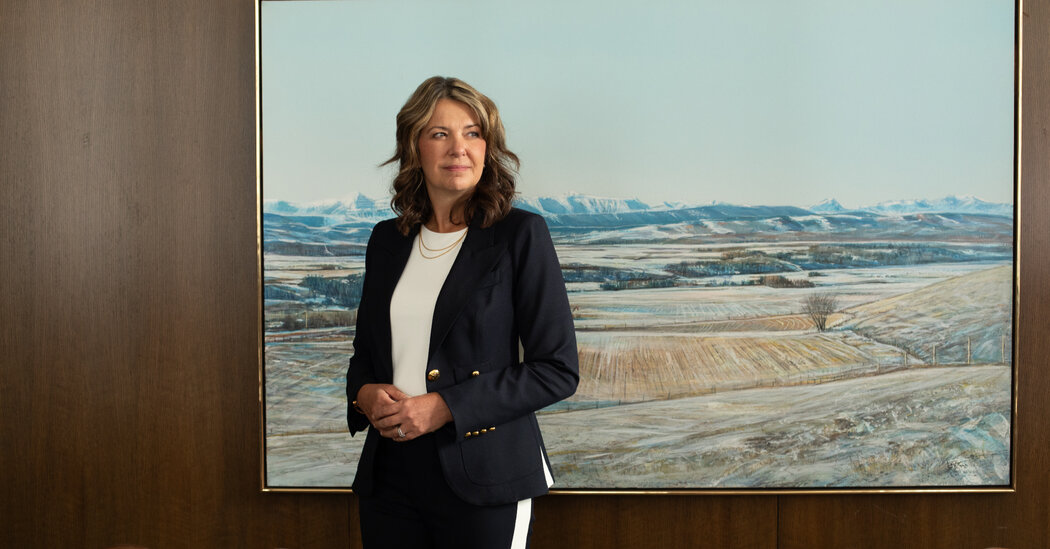As Canada barrels through one of the stormiest periods in its history toward an April 28 federal election, there’s a name that’s not on the ballot but is on people’s minds: Danielle Smith.
Ms. Smith, the premier of Alberta, the Western province often called the Texas of Canada because of its oil, ranches and conservative politics, is referred to as “divisive” by supporters and critics alike: People love her, people hate her, people love to hate her.
An unapologetic MAGA-aligned conservative, she has riled Canadians across the country by speaking admiringly of President Trump and focusing on her province’s fortunes, particularly its oil exports, even as the U.S. administration menaces Canada.
Ms. Smith, 54, has been premier for the past two and a half years, having spent the past two decades dipping in and out of politics.
“I keep getting fired,” she chuckled in an interview with The New York Times in Calgary, Alberta, in February.
She has also worked as an economist, a lobbyist and a radio host of a popular call-in show in which she honed her folksy, affable but sharply ideological raconteur style.
She’s the closest thing Canada’s conservative movement has to a MAGA ally — and has the Mar-a-Lago photograph with Mr. Trump to prove it.
As Mr. Trump started to say he wanted to make Canada the 51st state, before being inaugurated, Ms. Smith visited him in Florida.
Even before Mr. Trump’s re-election, Ms. Smith had been key in shaping the evolution of Canada’s broader conservative movement. Critics say she has courted ideological minorities, including fervent anti-vaccine organizations, advocates for Albertan secessionism and hard-line anti-trans activists, to secure her election.
She has been careful to make those groups feel included in her agenda while not fully endorsing their rhetoric.
That ability, along with the political freedom afforded by her lack of interest in national office, has put her at the vanguard of Canada’s changing right.
In recent months, Ms. Smith has defended her pro-Trump overtures as a diplomatic approach that complements the more aggressive stance taken by the federal government.
Simply put, she said of her Trump ties, “I’m happy to be good cop.”
Maple Leaf MAGA
Ms. Smith’s approach is underpinned by more than admiration for Mr. Trump and his politics.
It is also driven by her province’s unusual relationship with the United States, and the rest of Canada.
“Americans helped us build our two biggest industries, our cattle industry and our oil and gas industry,” she added, sitting in her office in Calgary.
Ms. Smith has qualified her support for Mr. Trump by saying she does not support his tariffs on Canada.
“I think it’s going to hurt them — it’s going to hurt us — but I think we can probably work our way through that,” she said.
She’s had to respond to criticism and calibrate her enthusiasm in the context of Mr. Trump’s calling for the annexation of Canada — “It’s not going to happen,” she said — and his ire over Canadian goods, including Alberta’s oil, which almost entirely heads to the United States and is subject to a 10 percent tariff (although a loophole to avoid the levy was subsequently introduced).
But she was generally effusive about Mr. Trump, recalling her January visit to his Mar-a-Lago club in Florida, where she saw him D.J. on an iPad and hold court after a game of golf.
Comeback Kids
And, she added, much like Mr. Trump, she has her own comeback story.
More than a decade ago, Ms. Smith was leading a small right-wing party in Alberta when she decided to join the larger provincial conservative party, a move that outraged her former colleagues but that she defended as an effort to unify the province’s conservatives.
The high-risk move backfired. Ms. Smith was not selected by the party to be a candidate for her electoral district and left politics for years.
In 2022, she came roaring back, winning her bid to lead Alberta’s United Conservative Party and then a provincial election to become premier.
To win, she took the opposite approach to the one she had tried a decade ago: Instead of tacking to the center, she led the party’s expansion to the right. She secured the support of libertarian grass-roots organizations, including a prominent citizens’ group that had organized around anti-vaccine mandates, as well as a movement seeking Albertan independence from the rest of Canada.
Albertan independence, in fact, would become a pressing question.
Western Promises
Ms. Smith has sought to use the question of Alberta’s relationship with the rest of Canada to her political advantage.
Many Albertans — not just the ones supporting independence — say that their province’s energy riches are being exploited by a federal government that takes revenues from them to bankroll poorer parts of the country.
And they rail against Ottawa for introducing climate policies that limit the province’s ability to extract and sell energy products.
Asked explicitly if she supported Alberta’s splitting away, Ms. Smith said, “We should go back to what the Constitution says,” referring to Canada’s federal system, in which provinces have power to manage several important policy areas. “The Constitution gives us areas of exclusive jurisdiction that the federal government keeps invading and trying to undermine.”
Secessionism advocates see, in Ms. Smith, an ally. Her chief of staff is a co-author of a crucial document, the Free Alberta Strategy, which lays out the reasoning for independence.
Another author, Barry Cooper, who teaches political science at the University of Calgary, said she was making the right noises. “I think she can advance our place within the federation,” he said.
Historically, separatism “has been an abstract concept related to Alberta going it alone,” said Jared Wesley, a professor at University of Alberta who researches the topic. It remains a minority view, though a recent poll from the Angus Reid Institute indicated support could grow if the Liberal Party won the upcoming federal election.
Ms. Smith has pledged to explore the idea of holding an independence referendum after that election and has threatened a rupture with the federal government to gain concessions.
Last month, after meeting Prime Minister Mark Carney, the Liberal leader in the elections, she said that she had “provided a specific list of demands the next prime minister, regardless of who that is, must address within the first six months of their term to avoid an unprecedented national unity crisis.”
The demands included several policies to bolster the province’s energy sector.
Blessing and Curse
Ms. Smith is playing a key role in mobilizing support for the federal Conservative leader, Pierre Poilievre, who is vying to become the country’s next prime minister and was also born in Alberta.
Together, Ms. Smith and Mr. Poilievre are defining a brand of Canadian conservatism focused on culture issues, limiting the government’s role in public and private life, and an anti-elite, anti-federal approach to running Canada. If Mr. Poilievre loses the election, that vision could be in jeopardy.
Both politicians supported the so-called Freedom Convoy, a movement with strong appeal in Alberta that began as a protest against Covid vaccine mandates for truck drivers, drew in other groups, turned violent in places and paralyzed the nation’s capital for weeks.
But Ms. Smith’s embrace can be a double-edged sword, as Mr. Poilievre is discovering.
In a Breitbart interview last month, she said that Mr. Poilievre was “in sync” with Mr. Trump and that she had asked the White House to “put things on pause” — a reference to the hostile climate between the two countries — until the election.
Critics said her remarks were an invitation to Washington to interfere with Canada’s elections in favor or Mr. Poilievre, whose combative style bears similarities to Mr. Trump’s. Mr. Poilievre has seen his once-large lead over the Liberals evaporate in the run-up to the vote, partly because many Canadians now consider Mr. Trump a major threat.
But Ms. Smith was, again, unapologetic, insisting that she was trying to do what was best for Canada, not just for Mr. Poilievre.
Right All Along
With Mr. Trump in the Oval Office, Ms. Smith seems to feel that, finally, her ideological side is winning.
She delights at Mr. Trump’s assault on what she calls “wokeism.”
But the policy area where her alignment with Mr. Trump’s movement is most pronounced is probably health. In fact, Ms. Smith says that Alberta has been leading the way.
“We were at the front end on protecting the choice of kids through the trans policy changes that we’ve made,” she added, referring to Alberta’s passing legislation limiting access to gender-affirming medical interventions for minors and other policies targeting transgender children.
Ms. Smith has opposed any mandatory vaccination, despite measles outbreaks in Canada and in the United States.
“Parents are pretty discerning,’’ she said. “They’re able to know which vaccines are best for their kids.”
Call In
While Ms. Smith has been at the forefront of the country’s hottest political debates, she still seems most comfortable on Alberta’s radio waves.
She takes questions from Albertans on a regular call-in program called “Your Province. Your Premier.”
She listens attentively and offers a smiling reply, no matter the topic, that unfailingly makes the caller feel as if they are making a really good point, however unreasonable it may be.
She credits her years as a call-in radio host for learning to listen to everyone, a quality that makes her likable, as even some of her harshest critics concede.
“I just would rather hear people out; it’s just the nice, polite thing to do,” she said, adding a rare reference to Canada rather than Alberta: “Maybe it’s just a Canadian thing.”


